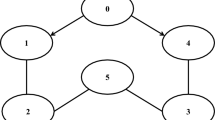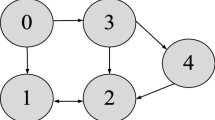Abstract
The model free fault-tolerant consensus tracking problem is investigated for multiagent systems subjected to actuator faults. For actuator fault detection, an auxiliary variable based model free fault detection algorithm is introduced to detect the faults, which is capable of detecting the faults occurring on different agents through any agent. The symmetric Laplacian matrix and known system dynamics are not required. When the fault is detected, radial basis function neural network is applied to estimate actuator faults. Next, the fault estimations are utilized to achieve controller reconstruction for the faulty agent. A distributed model free adaptive fault-tolerant consensus control method is developed to guarantee that all agents are able of tracking the expected trajectory. Compared with previous methods, the designed distributed fault-tolerant control method relies merely on agents’ input/output data and does not need Laplacian matrix to be symmetric. At last, a simulation is given to validate the effectiveness of developed method.

















Similar content being viewed by others
References
Sun QY, Han RK, Zhang HG, Zhou JG, Guerrero JM (2015) A multiagent-based consensus algorithm for distributed coordinated control of distributed generators in the energy internet. IEEE Trans Smart Grid 6(6):3006–3019
Wang QS, Huang D, Duan ZS, Wang JY (2019) Consensus tracking control with transient performance improvement for a group of unmanned aerial vehicles subject to faults and parameter uncertainty. Int J Control 92(4):796–815
Miao ZQ, Liu YH, Wang YN, Yi G, Fierro R (2018) Distributed estimation and control for leader-following formations of nonholonomic mobile robots. IEEE Trans Autom Sci Eng 15(4):1946–1954
Sun QY, Fan RY, Li YS, Huang BN, Ma DZ (2019) A distributed double-consensus algorithm for residential We-Energy. IEEE Trans Ind Informat 15(8):4830–4842
Yang DS, Zhang SC, Zhou BW, Bu SQ (2021) Consensus-based decentralized optimization for distributed generators power allocation over time-varying digraphs in microgrids. IEEE Syst J 15(1):814–825
Kuo CW, Tsai CC, Lee CT (2021) Intelligent leader-following consensus formation control using recurrent neural networks for small-size unmanned helicopters. IEEE Trans Syst Man Cybern Syst 51(2):1288–1301
Zuo ZY, Tian BL, Defoort M, Ding ZT (2018) Fixed-time consensus tracking for multiagent systems with high-order integrator dynamics. IEEE Trans Autom Control 63(2):563–570
Abdulghafor R, Abdullah SS, Turaev S, Zeki A, Al-Shaikhli I (2020) Linear and nonlinear stochastic distribution for consensus problem in multi-agent systems. Neural Comput Applic 32:261–277
Zou WC, Shi P, Xiang ZR, Shi Y (2020) Consensus tracking control of switched stochastic nonlinear multiagent systems via event-triggered strategy. IEEE Trans Neural Netw Learn Syst 31(3):1036–1045
Yang HJ, Ye D (2020) Distributed fixed-time consensus tracking control of uncertain nonlinear multiagent systems: a prioritized strategy. IEEE Trans Cybern 50(6):2627–2638
Wang W, Wen CY, Huang JS (2017) Distributed adaptive asymptotically consensus tracking control of nonlinear multi-agent systems with unknown parameters and uncertain disturbances. Automatica 77:133–142
Liu YY, Wang ZS (2022) Optimal output synchronization of heterogeneous multi-agent systems using measured input-output data. Inf Sci 582:462–479
Wu YZ, Hu JP, Xiang LY, Liang QP, Shi KB (2021) Finite-time output regulation of linear heterogeneous multi-agent systems. IEEE Trans Circuits Syst II Exp Briefs. https://doi.org/10.1109/TCSII.2021.3098095
Zhao C, Liu XZ, Zhong SM, Shi KB, Liao DX, Zhong QS (2021) Secure consensus of multi-agent systems with redundant signal and communication interference via distributed dynamic event-triggered control. ISA Trans 112:89–98
Pang ZH, Liu GP, Zhou DH, Sun DH (2017) Data-driven control with input design-based data dropout compensation for networked nonlinear systems. IEEE Trans Control Syst Technol 25(2):628–636
Yang DS, Sun YH, Wei QL, Zhang HG, Li T (2021) Topology prediction and structural controllability analysis of complex networks without connection information, IEEE Trans. Syst., Man, Cybern. Syst Data-driven consensus for non-linear networked multi-agent systems with switching topology and time-varying delays, IET Control Theory A. 12:1773–1779. https://doi.org/10.1109/TSMC.2021.3131490
Zhang HG, Jiang H, Luo YH, Xiao GY (2017) Data-driven optimal consensus control for discrete-time multi-agent systems with unknown dynamics using reinforcement learning method. IEEE Trans Ind Electron 64(5):4091–4100
Zhang HP, Yue D, Dou CX, Zhao W, Xie XP (2019) Data-driven distributed optimal consensus control for unknown multiagent systems with input-delay. IEEE Trans Cybern 49(6):2095–2105
Mu CX, Zhao Q, Gao ZK, Sun CY (2019) Q-learning solution for optimal consensus control of discrete-time multiagent systems using reinforcement learning. J Franklin Inst 356(13):6946–6967
Peng ZN, Luo R, Hu JP, Shi KB, Nguang SK, Ghosh BK (2021) Optimal tracking control of nonlinear multiagent systems using internal reinforce q-learning. Neural Netw Learn Syst IEEE Trans. https://doi.org/10.1109/TNNLS.2021.3055761
Hou ZS, Jin ST (2013) Model Free Adapt Control Theory Appl. CRC Press, Abingdon, U.K.
Hou ZS, Xiong SS (2019) On model-free adaptive control and its stability analysis. IEEE Trans Autom Control 64(11):4555–4569
Hou ZS, Jin ST (2011) Data-driven model-free adaptive control for a class of MIMO nonlinear discrete-time systems. IEEE Trans Neural Netw 22(12):2173–2188
Bu XH, Hou ZS, Zhang HW (2018) Data-driven multiagent systems consensus tracking using model free adaptive control. IEEE Trans Neural Netw Learn Syst 29(5):1514–1524
Li CJ, Liu GP (2018) Data-driven consensus for non-linear networked multi-agent systems with switching topology and time-varying delays. IET Control Theory A 12:1773–1779
Tan HR, Huang ZW, Wu M (2019) Data-based predictive control for networked non-linear multi-agent systems consensus tracking via cloud computing. IET Control Theory A 13:683–692
Tan HR, Miao ZQ, Wang YN, Wu M, Huang ZW (2020) Data-driven distributed coordinated control for cloud-based model-free multiagent systems with communication constraints. IEEE Trans Circuits Syst I Reg Papers 67(9):3187–3198
Tan HR, Wang YN, Wu M, Huang ZW, Miao ZQ, Distributed group coordination of multiagent systems in cloud computing systems using a model-free adaptive predictive control strategy. IEEE Trans Neural Netw Learn Syst. https://doi.org/10.1109/TNNLS.2021.3053016
Yang DS, Pang YH, Zhou BW, Li K (2019) Fault diagnosis for energy internet using correlation processing-based convolutional neural networks. IEEE Trans Syst Man Cybern Syst 49(8):1739–1748
Sun SX, Zhang HG, Sun JY, Li WH (2021) Reliable \(H_\infty \) guaranteed cost control for uncertain switched fuzzy stochastic systems with multiple time-varying delays and intermittent actuator and sensor faults. Neural Comput Applic 33:1343–1365
Guo CJ, Li F, Tian Z, Guo W, Tan SS (2020) Intelligent active fault-tolerant system for multi-source integrated navigation system based on deep neural network. Neural Comput Applic 32:16857–16874
Wang Y, Wang ZS (2022) Data-driven model-free adaptive fault-tolerant control for a class of discrete-time systems. IEEE Trans Circuits Syst II Exp Briefs 69(1):154–158
Wu YM, Wang ZS (2021) Fuzzy adaptive practical fixed-time consensus for second-order nonlinear multiagent systems under actuator faults. IEEE Trans Cybern 51(3):1150–1162
Wang ZS, Wu YM, Liu L, Zhang HG (2020) Adaptive fault-tolerant consensus protocols for multiagent systems with directed graphs. IEEE Trans Cybern 50(1):25–35
Wang X, Yang GH (2020) Fault-tolerant consensus tracking control for linear multiagent systems under switching directed network. IEEE Trans Cybern 50(5):1921–1931
Gong P, Lan WY, Han Q (2020) Robust adaptive fault-tolerant consensus control for uncertain nonlinear fractional-order multi-agent systems with directed topologies. Automatica 117:109011
Jin XZ, Wang SF, Qin JH, Zheng WX, Kang Y (2018) Adaptive fault-tolerant consensus for a class of uncertain nonlinear second-order multi-agent systems with circuit implementation. IEEE Trans Circuits Syst I Reg Papers 65(7):2243–2255
Shi CX, Yang GH, Li XJ (2019) Data-based fault-tolerant consensus control for uncertain multiagent systems via weighted edge dynamics. IEEE Trans Syst Man Cybern Syst 49(12):2548–2558
Wang JN, Zhou ZY, Wang CY, Ding ZT (2020) Cascade structure predictive observer design for consensus control with applications to UAVs formation flying. Automatica 121:109200
QuanY CW, Wu ZH, Peng L (2018) Distributed fault detection and isolation for leader-follower multi-agent systems with disturbances using observer techniques. Nonlinear Dynam 93:863–871
Wu YM, Wang ZS, Huang ZJ (2019) Distributed fault detection for nonlinear multi-agent systems under fixed-time observer. J Franklin Inst 356(13):7515–7532
Marino A, Pierri F, Arrichiello F (2017) Distributed fault detection isolation and accommodation for homogeneous networked discrete-time linear systems. IEEE Trans Autom Control 62(9):4840–4847
Das A, Lewis FL (2010) Distributed adaptive control for synchronization of unknown nonlinear networked systems. Automatica 46(12):2014–2021
Yang SP, Xu JX, Li XF (2016) Iterative learning control with input sharing for multi-agent consensus tracking. Syst Control Lett 94:97–106
Antonelli G, Arrichiello F, Caccavale F, Marino A (2014) Decentralized time-varying formation control for multi-robot systems. Int J Robotics Res 33(7):1029–1043
Tan GQ, Wang ZS, Reachable set estimation of delayed Markovian jump neural networks based on an improved reciprocally convex inequality, IEEE Trans Neural Netw Learn Syst https://doi.org/10.1109/TNNLS.2020.3045599.
Tan GQ, Wang ZS, Shi Z, Proportional-integral state estimator for quaternion-valued neural networks with time-varying delays, IEEE Trans Neural Netw Learn Syst https://doi.org/10.1109/TNNLS.2021.3103979.
Tian YF, Wang ZS (2021) Extended dissipativity analysis for markovian jump neural networks via double-integral-based delay-product-type Lyapunov functional. IEEE Trans Neural Netw Learn Syst 32(7):3240–3246
Tian YF, Wang ZS, A novel result on \(H\infty \) performance state estimation for Markovian neural networks with time-varying transition rates. Neural Comput Applic https://doi.org/10.1007/s00521-021-06291-1
Yu QX, Hou ZS, Bu XH, Yu QF (2020) RBFNN-based data-driven predictive iterative learning control for nonaffine nonlinear systems. IEEE Trans Neural Netw Learn Syst 31(4):1170–1182
Liu L, Wang ZS, Zhang HG (2015) Adaptive NN fault-tolerant control for discrete-time systems in triangular forms with actuator fault. Neurocomputing 152:209–221
Park J, Sandberg IW (1991) Universal approximation using Radial-Basis-Function Networks. Neural Comput 3(2):246–257
Mohammadzadeh A, Rathinasamy S (2020) Energy management in photovoltaic battery hybrid systems: A novel type-2 fuzzy control. Int J Hydrogen Energ 45(41):20970–20982
Mohammadzadeh A, Kumbasar T (2020) A new fractional-order general type-2 fuzzy predictive control system and its application for glucose level regulation. Appl Soft Comput 91:106241
Mosavi A, Qasem SN, Shokri M, Band SS, Mohammadzadeh A (2020) Fractional-order fuzzy control approach for photovoltaic/battery systems under unknown dynamics, variable irradiation and temperature. Electronics 9(9):1455
Shi XY, Cao YJ, Shahidehpour M, Li Y, Wu X, Li ZY (2020) Data-driven wide-area model-free adaptive damping control with communication delays for wind farm. IEEE Trans Smart Grid 11(6):5062–5071
Hashjin SA, Pang SZ, Miliani E, Ait-Abderrahim K, Nahid-Mobarakeh B (2020) Data-driven model-free adaptive current control of a wound rotor synchronous machine drive system. IEEE Trans Transp Electr 6(3):1146–1156
Fetanat M, Stevens M, Hayward C, Lovell NH (2020) A physiological control system for an implantable heart pump that accommodates for interpatient and intrapatient variations. IEEE Trans Biomed Eng 67(4):1167–1175
Acknowledgements
This work was supported by National Natural Science Foundation of China (No. 61973070), SAPI Fundamental Research Funds (No. 2018ZCX22), and Liaoning Revitalization Talents Program (No. XLYC1802010).
Author information
Authors and Affiliations
Corresponding author
Ethics declarations
Conflict of interest
The authors have no known competing interest.
Additional information
Publisher's Note
Springer Nature remains neutral with regard to jurisdictional claims in published maps and institutional affiliations.
Rights and permissions
About this article
Cite this article
Wang, Y., Wang, Z. Model free adaptive fault-tolerant consensus tracking control for multiagent systems. Neural Comput & Applic 34, 10065–10079 (2022). https://doi.org/10.1007/s00521-022-06992-1
Received:
Accepted:
Published:
Issue Date:
DOI: https://doi.org/10.1007/s00521-022-06992-1




